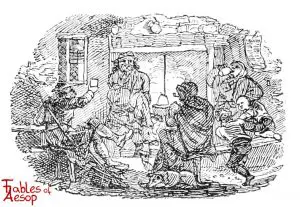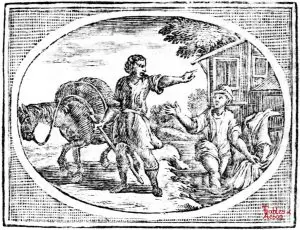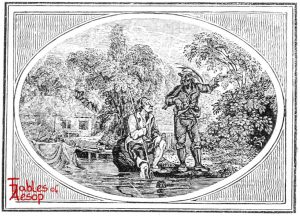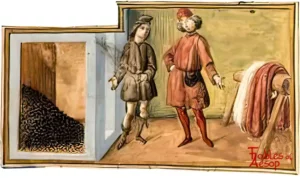A charcoal maker invited a cloth cleaner to visit. The cleaner declined because as quickly as he could clean anything it would get dirty again.
Like people will work better together.
The Charcoal Maker invited a Cloth Cleaner friend to live with him to share expenses. The Cloth Cleaner declined fearing that charcoal would dirty all of his cloth.

V.S. Vernon Jones Version
There was once a Charcoal-burner who lived and worked by himself. A Fuller, however, happened to come and settle in the same neighbourhood; and the Charcoal-burner, having made his acquaintance and finding he was an agreeable sort of fellow, asked him if he would come and share his house: “We shall get to know one another better that way,” he said, “and, beside, our household expenses will be diminished.” The Fuller thanked him, but replied, “I couldn’t think of it, sir: why, everything I take such pains to whiten would be blackened in no time by your charcoal.”

Samuel Croxall (The Collier and the Fuller)
THE Collier and the Fuller being old acquaintances, happened upon a time to meet together; and the latter, being ill provided with a habitation, was invited by the former to come and live in the same house with him. 1 thank you, my dear friend, replied the Fuller, for your kind offer, but it cannot be: for if I were to dwell with you, whatever I should take pains to scour and make clean in the morning, the dust of you and your coals would blacken and detile, as bad as ever, before night,
THE APPLICATION
It is of no small importance in life to be cautious what company we keep, and with whom we enter into friendships; for though we are ever so well disposed ourselves, and happen to be ever so free from vice and debauchery, yet, if those with whom we frequently converse are engaged in a lewd, wicked course, it will be almost impossible for us to escape being drawn in with them. If we are truly wise, and would shun those syren rocks of pleasure, upon which so many have split before us, we should forbid ourselves all manner of commerce and correspondence with those who are steering a course, which reason tells us is not only not for our advantage, but would end in our destruction. All the virtue we can boast of will not be sufficient to insure us, if we embark in bad company: for though our philosophy were such, as we could preserve ourselves from being tainted and infected with their manners, yet their character would twist and entwine itself along with ours, in so intricate a fold, that the world would not take the trouble to unravel and separate them. Reputations are of a subtle insinuating texture, like water; that which is derived from the clearest spring, if it chances to mix with a foul current, runs on, undistinguished, in one muddy stream, for the future, and must for ever partake of the colour and condition of its associate.

JBR Collection
A friendly Collier meeting one day with a fuller, an old acquaintance of his, kindly invited him to come and share his house. “A thousand thanks for your civility,” replied the Fuller; “but I am rather afraid that as fast as I make anything clean. you will be for smutting it again.”

Thomas Bewick (The Collier and The Fuller)
The Collier and the Fuller being old acquaintances, happened upon a time to meet together, and the latter being but ill provided with a habitation, was invited by the former to come and live in the same house with him. I thank you, my dear friend, replied the Fuller, for your kind offer; but it cannot be, for if I were to dwell with you, whatever I should take pains to scour and make clean in the morning, the dust of you and your coals would blacken and defile before night.
APPLICATION.
It is of no small importance in life to be cautious what company we keep, and with whom we enter into friendship; for though we are ever so well disposed ourselves, and free from vice, yet if those with whom we frequently converse, are engaged in a lewd, wicked course, it will be almost impossible for us to escape being drawn in with them. If we are truly wise, and would shun those rocks of pleasure upon which so many have split, we should forbid ourselves all manner of commerce and correspondence with those who are steering a course, which reason tells us is not only not for our advantage, but would end in our destruction. All the virtue we can boast of, will not be sufficient to insure our safety, if we embark in bad company; for though our philosophy were such as would preserve us from being tainted and infected with their manners, yet their characters would twist and entwine themselves along with ours, in so intricate a fold, that the world would not take the trouble to unravel and separate them. Reputation is of a blending nature, like water; that which is derived from the clearest spring, if it chance to mix with a foul current, runs on undistinguished, in one muddy stream, and must ever partake of the colour and condition of its associate.


Townsend version
A charcoal-burner carried on his trade in his own house. One day he met a friend, a Fuller, and entreated him to come and live with him, saying that they should be far better neighbors and that their housekeeping expenses would be lessened. The Fuller replied, “The arrangement is impossible as far as I am concerned, for whatever I should whiten, you would immediately blacken again with your charcoal.”
Moral
Like will draw like.

L’Estrange version
A fuller had a very kind invitation from a collyer to come and live in the house with him. He gave him a thousand thanks for his civility; but told him that it would not stand with his convenience; for (says he) as fast as I make any thing clean, you’ll be smutting it again.
Moral
‘Tis a necessary rule in allyances, matches, societies, fraternities, friendships, partnerships, commerce, and all manner of civil dealings and contracts, to have a strief regard to the humour, the nature, and the disposition of those we have to do withall.

Gherardo Image from 1480

Carbonarius et Fullo
Carbonarius, qui spatiosam habebat domum, invitavit fullonem ut ad se commigraret. Ille respondit, “Quaenam inter nos esse possit societas, cum tu vestes, quas ego nitidas reddidissem, fuligine et maculis inquinaturus esses?”
Perry #029


